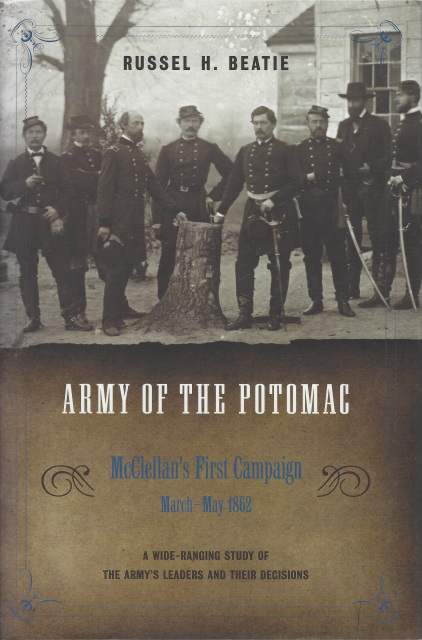ARMY OF THE POTOMAC: MCCLELLAN'S FIRST CAMPAIGN, MARCH - MAY 1862 by Russel H. Beatie
Army of the Potomac: McClellan's First Campaign, March - May 1862 by Russel H. Beatie
McClellan's First Campaign, the third volume of Russel H. Beatie's magisterial series, covers the pivotal early months of General George B. McClellan's Peninsula Campaign through the siege of Yorktown, the pursuit toward Richmond, and the battle of Williamsburg.
As he did in his first two volumes, Beatie tells the story largely through the eyes and from the perspective of high ranking officers, staff officers, and politicians. Grounded in extensive firsthand research, including many previously unused and unpublished sources, Beatie's effort rewrites the history of Little Mac's inaugural effort to push his way up the Virginia peninsula and capture Richmond in one bold campaign.
In meticulous fashion, Beatie examines many heretofore unknown, ignored, or misunderstood facts and events and uses them to evaluate the campaign in the most balanced and detailed historical context ever attempted. He examines every aspect of these critically important weeks, from how McClellan's Urbanna plan unraveled and led to the birth of the expedition that debarked at Fort MOnroe in March 1862, to the debut of the Union corps organization in the sharp combat at Williamsburg.
There were many reasons why the march to Richmond did not move as expeditiously as many hoped it would, though until now, few of these reasons have been satisfactorily (or even fairly) explored. President Abraham Lincoln's interference, both politically and militarily, argues Beatie persuasively, lengthened considerably McClellan's odds of success. Just one example was the president's tampering with the corps command structure. Lincoln's experiment undermined his army commander by elevating the wrong men to positions of importance, a sad fact amply demonstrated by the inept leadership displayed in front of Yorktown and during the Williamsburg fighting. Beatie is the first author to deeply investigate and expose the critical role of the Navy in the Yorktown episode. His sweeping and convincing conclusion is that if the Navy had done what it promised it would do -- what it could have done, but refused to do -- Yorktown would have fallen weeks sooner than it did. McClellan's First Campaign is about the men in command -- their knowledge, intentions, successes, and failures. To capture the full flavor of their experiences, Beatie employs the "fog of war" technique, which puts the reader in the position of the men who led the Union army. The Confederate adversaries are always present, but often only in shadowy forms that achieve firm reality only when we meet them face-to-face on the battlefield.
Well written, judiciously reasoned, and extensively footnoted, readers will recognize McClellan's First Campaign as the seminal work on this topic. Students of the early war fighting in the Eastern Theater may not always agree with Beatie's conclusions, but they will concur that his account offers an original examination of the Army of the Potomac's role on the Virginia peninsula.
Savas Beatie, Hardcover, 2007
THIS IS A BRAND NEW BOOK.
